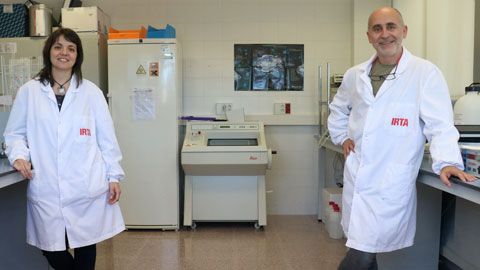The WHO includes Joaquim Segalés and Júlia Vergara in the working group on animal models of COVID-19
Joaquim Segalés, Professor of the Department of Animal Health and Anatomy at the UAB, and Júlia Vergara, both CReSA researchers, join the WHO working group. The aim is to find the most suitable animal models for developing treatments and vaccines for the disease.

In order to find a safe and effective treatment and vaccine to combat COVID-19, it is necessary to develop an animal model that reproduces the disease as suffered by humans. For this reason, the World Health Organization (WHO) R&D Blueprint team of priority diseases has brought together several scientists from research centers around the world in a working group to accelerate the search for the best animal models to make facing the pandemic. Two of these scientists are Júlia Vergara-Alert and Joaquim Segalés, researchers at the Animal Health Research Center (CReSA) of the Institute for Agrifood Research and Technology (IRTA), at the UAB campus. Segalés is also a professor at the Faculty of Veterinary Medicine of the Autonomous University of Barcelona (UAB).
With this initiative, the WHO aims to provide a global response to COVID-19 with leading research centers in the design of animal models. Since its creation a few months ago, the working group meets weekly. "At the moment, it is important that there are various research groups around the world that can share current knowledge about the disease, the immunity it generates and what proposals for animal models are being considered. In this way, the possibilities of having various products available on the market are multiplied", explains Segalés. In fact, a crucial role that WHO plays with these specific working groups is to bring research into contact with the world of the pharmaceutical industry.
The recognition of Vergara-Alert and Segalés by the WHO positions IRTA at a higher level of international dimension that will also allow the establishment of more scientific collaborations. "We are very proud to be part of this group alongside great experts," say the researchers, who point out that "it is a recognition of the center and all the people who work there, the effort for the last 20 years”.
This research center has been working for more than 6 years with animal models of the MERS coronavirus, the cause of the Middle East Respiratory Syndrome, with which they tested a first prototype vaccine for dromedaries. "The prior knowledge and experience we had with this other coronavirus has been a plus and has allowed us to go faster in many ways," says Vergara-Alert.
The working group has about 90 experts on WHO animal models. In Spain, researchers Luis Enjuanes and Mariano Esteban from the National Biotechnology Center of the CSIC are also part of it, with which IRTA-CReSA has carried out some international projects related to the MERS coronavirus.
IRTA-CReSA, the only public research center in Catalonia listed as a unique infrastructure that can work with SARS-CoV-2 in vitro and in vivo with small and large animals
In any process of registering an antiviral product or a vaccine, different stages of development must be carried out, which usually take a few months. These phases include working with the active SARS-CoV-2 virus both in vitro in the laboratory and in vivo, in animals, which can only be carried out under conditions of maximum biosecurity. "We have a High Biocontainment Unit designed to work with danger group 3 pathogens, such as this coronavirus. This has allowed us, first of all, to isolate the virus from patient samples and replicate it in cell cultures so that we can conduct efficacy studies on drugs and vaccine candidates. On the other hand, in the facilities we also have the ability to develop animal models for the disease, a fundamental phase to check the effectiveness of the products before testing them on humans", explains Vergara-Alert.
The animal models proposed by IRTA-CReSA researchers to test possible drugs and the vaccine are, for now, transgenic mice and hamsters. This research activity is carried out together with the AIDS Research Institute (IrsiCaixa) and the Barcelona Supercomputing Center, with which IRTA forms a consortium funded by the company Grifols.
IRTA-CReSA and the Center for Research in Animal Health (INIA-CISA) are the only public research centers in Spain with a high level of biosafety recognized as Scientific and Tea Infrastructure.
About IRTA-CReSA center
The Animal Health Research Center (CReSA) is a center of the Institute of Agrifood Research and Technology (IRTA), at the UAB campus, a research institute owned by the Government of Catalonia adscribed to the Department of Agriculture.
The UAB, with Sustainable Development Goals
Good health and well-being